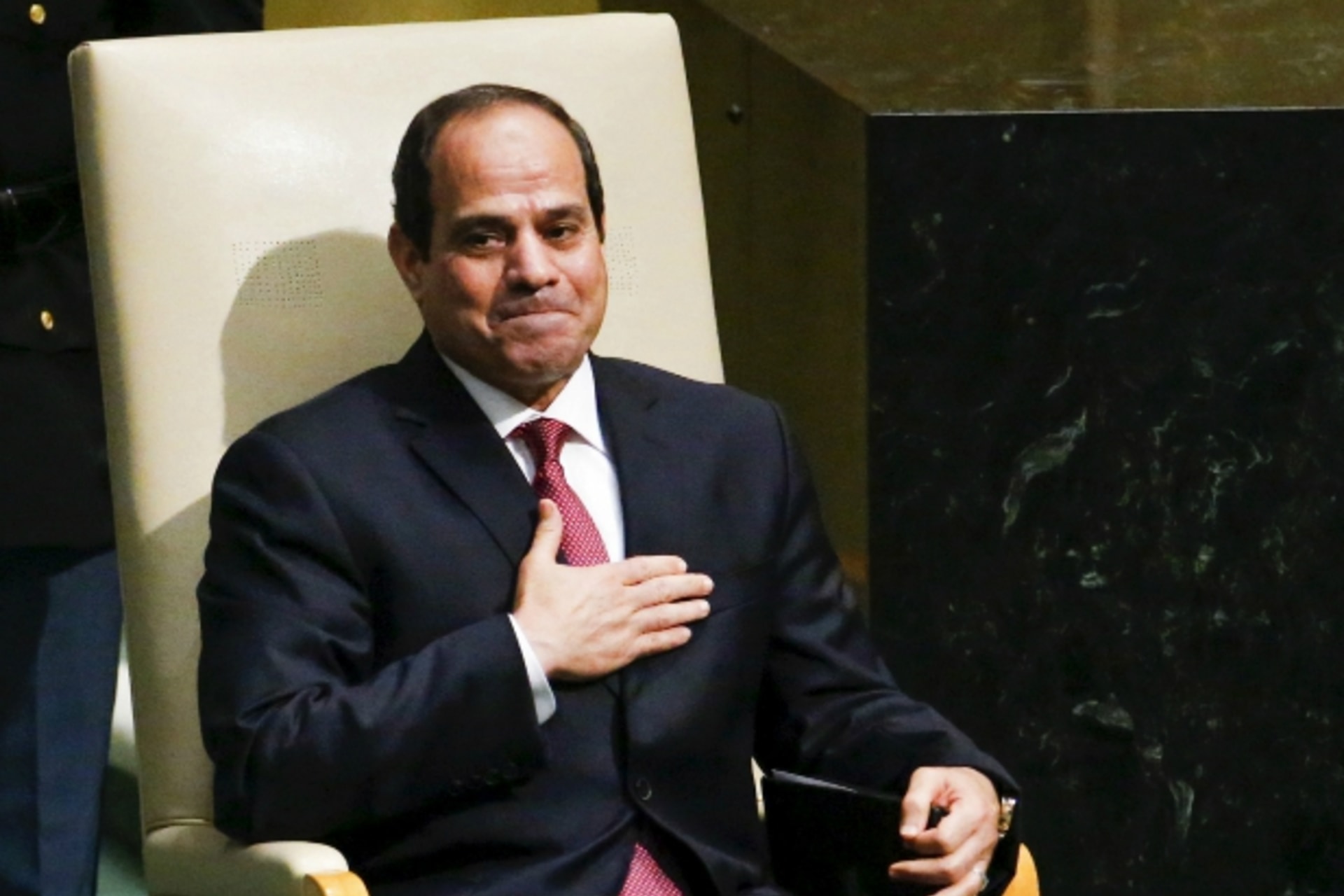Sisi’s Struggle for Egypt

By experts and staff
- Published
Experts
![]() By Steven A. CookEni Enrico Mattei Senior Fellow for Middle East and Africa Studies
By Steven A. CookEni Enrico Mattei Senior Fellow for Middle East and Africa Studies
I have always wondered why leaders of foreign countries feel the need to publish opinion pieces in American newspapers of record. Who exactly are they trying to influence? The folks at the White House, the State Department, the Pentagon, the Treasury, and the Central Intelligence Agency (CIA) generally know a lot more about conditions in a given country than what these leaders are trying to convey in 750 to 850 words. Maybe such op-eds are meant for members of Congress and their staffs, many of whom are just far too busy to focus on any one issue. Perhaps they’re intended to build support with the American public, but with the exception of a few issues—transnational terrorism, Israel, Iraq (sort of), and the Iran nuclear deal—Americans do not seem much interested in what foreign leaders are doing at home to make their economies grow and provide opportunities for their citizens. I can only presume that foreign leaders believe it will accrue to their domestic political benefit by having an op-ed in one of America’s elite newspapers.
This brings me to Monday’s op-ed in the Wall Street Journal under Egyptian President Abdel Fattah al-Sisi’s byline. I am going to guess that Sisi did not actually write the op-ed and that it was placed in the Journal, which has been friendlier to the Egyptian leader than either the New York Times or the Washington Post, so that the Egyptian media can trumpet the fact that their president has been published in one of America’s most influential newspapers. Still, I cannot imagine who in Egypt actually cares about this, but it was an interesting piece of writing anyway. Whether intended or otherwise, it reveals that Sisi understands what makes Egyptians tick, though he does not grasp that his approach to governing is at odds with what his people desire above all—dignity, economic development and social justice, and representative government.
Strip away all the consultant speak about “creat[ing] a dynamic, competitive and private-sector-led platform for growth”—blah, blah, blah—or the wonky discussion of a value-added tax (all included to convey the impression that Sisi can talk shop with folks like Gregory Mankiw) and the Egyptian leader is talking about some old and familiar themes in Egyptian politics—dignity and social justice. In the first sentence Sisi writes, “Over the past two years, the Egyptian people resolved to regain control of our destiny as a nation and began a process of political, social, and economic renewal.” Forget for a moment—as many Egyptians apparently have—that everything that has happened since January 25, 2011, is the result of decisions that Egypt’s people have made. The very fact that the piece is framed around Egyptians asserting control over their own society indicates that Sisi (or whoever helped the folks at Glover Park Group write the piece) understands the centrality of dignity in Egypt’s nationalist narrative. Yet what dignity is there in a society where arbitrary government is the norm? Where leaders invoke the ideals of two “revolutions” while consistently violating them? Like Mohammed Morsi, Hosni Mubarak, Anwar al-Sadat, and Gamal Abdel Nasser before him, Sisi presides over a system that is rigged to favor the few, leaving the rest of society at the mercies of an unjust judiciary, brutal security services, and an indifferent bureaucracy. The military intervention (or revolution or coup) that brought Morsi’s brief tenure to an end may have restored what the military, judges, police generals, and big business elite believe to be the natural order of things, but that order is and remains profoundly unjust and thus bereft of dignity.
Egyptians also want economic development and social justice, which is, in the main, what Sisi’s op-ed is all about. To Sisi’s credit, he addresses the widely held perception that Egypt’s economic growth in the mid-2000s was a crony capitalist bonanza that did little more than enrich the very few and well-connected at the expense of the Egyptian people. The Egyptian president assures his readers that under his watch, “We aim to balance the objective of lowering government deficits against our commitment to promote social justice. This means to ensure that growth this time around will benefit all Egyptians, and not just a few.” Thus far, however, it seems that the Egyptian government has taken action to lower deficits, but has not addressed the issue of social justice—which is not just about sharing the benefits of a growing economy—other than rhetorically. Consider the big policy announcement contained within the op-ed—a value-added tax. A VAT is a good way of raising revenue and thus closing deficits, but it is also regressive, disproportionately affecting the poor who spend more as a percentage of income on basic goods than the wealthy. It is unclear to me from what I have read how Sisi and his advisors plan to address this issue. One of the reasons why Egyptians were so angry at the end of the Mubarak period was the reality of a threadbare social safety net. It’s true; times change and the era of meyya meyya walla ferakh el-gam‘eyya (roughly: A chicken in every pot) are long gone, but the Egyptian state has left the vast majority of citizens to fend for themselves while failing to help give them the means to cope through, for example, a decent education or access to medical care.
Finally, Egyptians want representative government, which Sisi says he is going to give to them, declaring:
I look forward to the contribution that Parliament will soon make in rebuilding Egypt, crafting new laws to foster the country’s path toward development and greater shared prosperity, and monitoring the government’s performance and representing the interests of the people.
That sounds positively great, but it seems unlikely. Previously, the Egyptian president has expressed a rather Sadat-like view of the function of political parties and parliaments. Like Sadat in 1976 when he authorized platforms within the Arab Socialist Union that would later become parties, Sisi believes that they and the legislative body in which their representatives sit have a responsibility to support the government as a loyal opposition. After all, Sisi has called for a single electoral list that would “rise above narrow-minded partisan and personal interests and achieve supreme national interests.” Beyond this view it is hard to reconcile Sisi’s sunny characterization of the coming role of parliament and the very fact that those who dare raise an objection to the quality of Egyptian politics, including journalists who are seeking the truth—better known as doing their job—are jailed indiscriminately. It was admirable that Sisi pardoned one hundred people on the eve of his visit to New York for the United Nations General Assembly meetings, but what about the tens of thousands of others? I am sure Egyptians of a certain perspective who might read this post will accuse me of harboring sympathies for the Muslim Brotherhood, but forget about the Brothers; why are people like Alaa Abdel Fattah or Ahmed Maher or Esraa el-Taweel—who are erroneously believed, perhaps out of convenience, to be members of the Muslim Brotherhood—and other like them in jail? Why have other Egyptians—again, not the Brothers who have set up shop in Istanbul and London—fled the country in fear of arrest? There would be no reason if the Egyptian leadership were genuinely interested in representative government.
Sisi closes his op-ed admitting that transitions are hard. They are. Most of them fail. Egypt would likely be in better shape politically, economically, and socially if those in power actually sought to protect the revolution rather than merely proclaiming the benefit of the Wall Street Journal’s readers, most of whom have a passing, at best, interest in what happens in Egypt.
